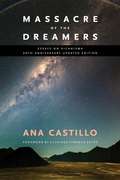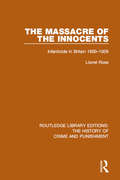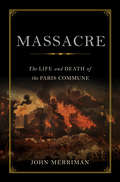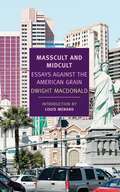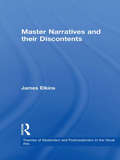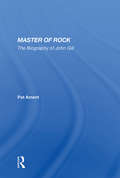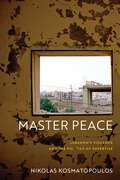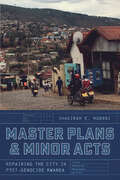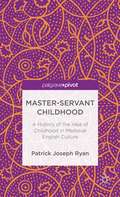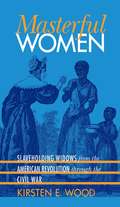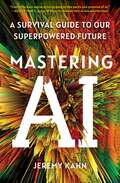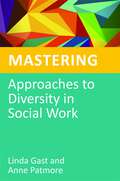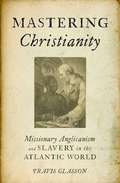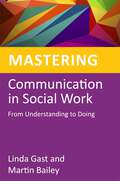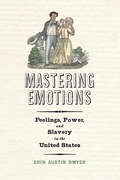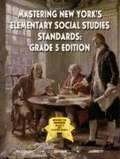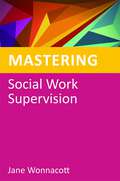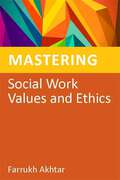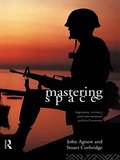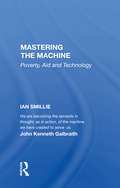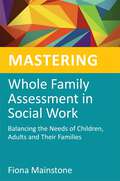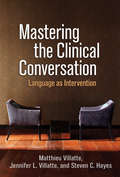- Table View
- List View
Massacre of the Dreamers
by Ana Castillo Clarissa Pinkola EstésGustavus Myers Outstanding Book Award from the Gustavus Myers Center for the Study of Bigotry and Human Rights This new edition of an immensely influential book gives voice to Mexic Amerindian women silenced for hundreds of years by the dual censorship of being female and indigenous. Castillo replaced the term "Chicana feminism" with "Xicanisma" to include mestiza women on both sides of the border. In history, myth, interviews, and ethnography Castillo revisits her reflections on Chicana activism, spiritual practices, sexual attitudes, artistic ideology, labor struggles, and education-related battles. Her book remains a compelling document, enhanced here with a new afterword that reexamines the significance of Our Lady of Guadalupe.
Massacre of the Dreamers: Essays on Xicanisma. 20th Anniversary Updated Edition.
by Ana CastilloGustavus Myers Outstanding Book Award from the Gustavus Myers Center for the Study of Bigotry and Human RightsThis new edition of an immensely influential book gives voice to Mexic Amerindian women silenced for hundreds of years by the dual censorship of being female and indigenous. Castillo replaced the term &“Chicana feminism&” with &“Xicanisma&” to include mestiza women on both sides of the border. In history, myth, interviews, and ethnography Castillo revisits her reflections on Chicana activism, spiritual practices, sexual attitudes, artistic ideology, labor struggles, and education-related battles. Her book remains a compelling document, enhanced here with a new afterword that reexamines the significance of Our Lady of Guadalupe.
Massacre of the Innocents: Infanticide in Great Britain 1800-1939 (Routledge Library Editions: The History of Crime and Punishment #7)
by Lionel RoseBefore contraception was generally available, and when abortion was fraught with danger, infanticide was a common solution to the problem of unwanted children. Massacre of the Innocents, first published in 1986, shows the causes and consequences of the high tide of infanticide in Victorian Britain. Lionel Rose describes the ways in which unwanted and ‘surplus’ infants were disposed of, and the economic and social pressures on women to rid themselves of their burdens by covert criminal and sub-criminal means. He discusses the activities of infanticidal and abortionist midwives, and shows how the practices of wet nursing and baby farming were closely related to infanticide. Unscrupulous insurance salesman even turned infanticide into a profitable business, in their reckless grab for commissions. Infanticide declined with the growing practice of contraception, the lessening of pressure of unmarried mothers, and as adoption was made easier. This is a hard-hitting, scrupulously documented piece of social history. This title will be of interest to students of history and criminology.
Massacre: The Life and Death of the Paris Commune
by John MerrimanThe Paris Commune lasted for only 64 days in 1871, but during that short time it gave rise to some of the grandest political dreams of the nineteenth century—before culminating in horrific violence. Following the disastrous French defeat in the Franco-Prussian War, hungry and politically disenchanted Parisians took up arms against their government in the name of a more just society. They expelled loyalists and soldiers and erected barricades in the streets. In Massacre, John Merriman introduces a cast of inimitable Communards—from les pétroleuses (female incendiaries) to the painter Gustave Courbet—whose idealism fueled a revolution. And he vividly recreates the Commune’s chaotic and bloody end when 30,000 troops stormed the city, burning half of Paris and executing captured Communards en masse. A stirring evocation of the spring when Paris was ablaze with cannon fire and its citizens were their own masters, Massacre reveals how the indomitable spirit of the Commune shook the very foundations of Europe.
Masscult and Midcult: Essays Against the American Grain
by Louis Menand John Summers Dwight MacdonaldA New York Review Books OriginalAn uncompromising contrarian, a passionate polemicist, a man of quick wit and wide learning, an anarchist, a pacifist, and a virtuoso of the slashing phrase, Dwight Macdonald was an indefatigable and indomitable critic of America's susceptibility to well-meaning cultural fakery: all those estimable, eminent, prizewinning works of art that are said to be good and good for you and are not. He dubbed this phenomenon "Midcult" and he attacked it not only on aesthetic but on political grounds. Midcult rendered people complacent and compliant, secure in their common stupidity but neither happy nor free.This new selection of Macdonald's finest essays, assembled by John Summers, the editor of The Baffler, reintroduces a remarkable American critic and writer. In the era of smart, sexy, and everything indie, Macdonald remains as pertinent and challenging as ever.
Master Narratives and their Discontents (Theories of Modernism and Postmodernism in the Visual Arts #Vol. 1)
by James ElkinsIn this bracing engagement with the many versions of art history, James Elkins argues that the story of modernism and postmodernism is almost always told in terms of four narratives. Works of art are either seen as modern or postmodern, or praised for their technical skill or because of the politics they appear to embody. These are master narratives of contemporary criticism, and each leads to a different understanding of what art is and does. Both a cogent overview of the state of thinking about art and a challenge to think outside the art historical box, Master Narratives and their Discontents is the first volume in a series of short books on the theories of modernism by leading art historians on twentieth-century art and art criticism.
Master Of Rock: The Biography of John Gill
by Pat AmentCelebrated as the father of modern bouldering, John Gill is an awe-inspiring climber with immense talent. This book provides an insight into the life of Gill as he developed into a world leading and climbing pioneer and an inspirational climber. He is a pioneer in his approach to bouldering with his impressive accomplishments, such as the one-arm f
Master Peace: Lebanon's Violence and the Politics of Expertise (The Ethnography of Political Violence)
by Nikolas KosmatopoulosExamines the politics of expertise in the practices of peacemaking in post–civil war LebanonBased on multi-sited ethnographic research centering on Beirut, but tracing international peace work as far as Switzerland and the United States, Master Peace examines the politics of expertise in the application of metropolitan theories of violence and practices of peacemaking in post–civil war Lebanon. Through ethnographic encounters, archival research, and interviews that shed light on the worlds of academic research, UN agencies, NGOs, and think tanks, Nikolas Kosmatopoulos argues that so-called experts, from violence researchers to peace professionals, have often misrepresented and exacerbated the violence they claim to be tackling, through their deployment of racialized tropes of conflict and communalizing peace practices.The assemblage of these tropes and practices, which Kosmatopoulos calls “master peace,” naturalizes social and structural inequalities by collapsing them into supposedly innate cultural and sectarian divisions. Master peace installs unequal relations of domination through the work of metropolitan theories, as in “ethnic conflict” and “failed state,” and practices, such as conflict resolution workshops and crisis reports, converting the radical demand for just peace into a postcolonial regime of dependence on technocratic tools, unaccountable experts, and external donors.Kosmatopoulos shows how master peace has been framing debates, designing interventions of peace and war, and defining the problem of violence in Lebanon and the Middle East for decades, to deleterious effect. As the supposed moral high ground that justifies external intervention and precludes political solutions or democratic forms of action, master peace has obscured the geopolitical and ideological nature of violence in the region, substituting democratic notions of peace for an elitist antipolitics of expertise characterized by dependence, domination, and epistemic violence.
Master Plans and Minor Acts: Repairing the City in Post-Genocide Rwanda
by Shakirah E. HudaniAn examination of planning, place, and the politics of repair in post-genocide Rwanda. Master Plans and Minor Acts examines a “material politics of repair” in post-genocide Rwanda, where in a country saturated with deep historical memory, spatial master planning aims to drastically redesign urban spaces. How is the post-conflict city reconstituted through the work of such planning, and with what effects for material repair and social conciliation? Through extended ethnographic and qualitative research in Rwanda in the decades after the genocide of 1994, this book questions how repair after conflict is realized amidst large-scale urban transformation. Bridging African studies, urban studies, and human geography in its scope, this work ties Rwanda’s transformation to contexts of urban change in other post-conflict spaces, bringing to the fore critical questions about the ethics of planning in such complex geographies.
Master-Servant Childhood: A History of the Idea of Childhood in Medieval English Culture
by Patrick Joseph RyanAn interdisciplinary synthesis that offers a new understanding of childhood in the Middle Ages as a form of master-servant relation embedded in an ancient sense of time as a correspondence between earthly change and eternal order.
Masterful Women
by Kirsten E. WoodMany early-nineteenth-century slaveholders considered themselves "masters" not only over slaves, but also over the institutions of marriage and family. According to many historians, the privilege of mastery was reserved for white males. But as many as one in ten slaveholders--sometimes more--was a widow, and as Kirsten E. Wood demonstrates, slaveholding widows between the American Revolution and the Civil War developed their own version of mastery.Because their husbands' wills and dower law often gave women authority over entire households, widowhood expanded both their domestic mandate and their public profile. They wielded direct power not only over slaves and children but also over white men--particularly sons, overseers, and debtors. After the Revolution, southern white men frequently regarded powerful widows as direct threats to their manhood and thus to the social order. By the antebellum decades, however, these women found support among male slaveholders who resisted the popular claim that all white men were by nature equal, regardless of wealth. Slaveholding widows enjoyed material, legal, and cultural resources to which most other southerners could only aspire. The ways in which they did--and did not--translate those resources into social, political, and economic power shed new light on the evolution of slaveholding society.
Mastering AI: A Survival Guide to Our Superpowered Future
by Jeremy KahnA Fortune magazine journalist draws on his expertise and extensive contacts among the companies and scientists at the forefront of artificial intelligence to offer dramatic predictions of AI&’s impact over the next decade, from reshaping our economy and the way we work, learn, and create to unknitting our social fabric, jeopardizing our democracy, and fundamentally altering the way we think.Within the next five years, Jeremy Kahn predicts, AI will disrupt almost every industry and enterprise, with vastly increased efficiency and productivity. It will restructure the workforce, making AI copilots a must for every knowledge worker. It will revamp education, meaning children around the world can have personal, portable tutors. It will revolutionize health care, making individualized, targeted pharmaceuticals more affordable. It will compel us to reimagine how we make art, compose music, and write and publish books. The potential of generative AI to extend our skills, talents, and creativity as humans is undeniably exciting and promising. But while this new technology has a bright future, it also casts a dark and fearful shadow. AI will provoke pervasive, disruptive, potentially devastating knock-on effects. Leveraging his unrivaled access to the leaders, scientists, futurists, and others who are making AI a reality, Kahn will argue that if not carefully designed and vigilantly regulated AI will deepen income inequality, depressing wages while imposing winner-take-all markets across much of the economy. AI risks undermining democracy, as truth is overtaken by misinformation, racial bias, and harmful stereotypes. Continuing a process begun by the internet, AI will rewire our brains, likely inhibiting our ability to think critically, to remember, and even to get along with one another—unless we all take decisive action to prevent this from happening. Much as Michael Lewis&’s classic The New New Thing offered a prescient, insightful, and eminently readable account of life inside the dot-com bubble, Mastering AI delivers much-needed guidance for anyone eager to understand the AI boom—and what comes next.
Mastering Christianity: Missionary Anglicanism and Slavery in the Atlantic World
by Travis GlassonThis book provides a unique perspective on the development and entrenchment of a pro-slavery ideology by showing how English religious thinking furthered the development of slavery and supported the institution around the Atlantic world.
Mastering Communication in Social Work: From Understanding to Doing
by Jane Wonnacott Linda Gast Martin BaileyCommunication skills are fundamental to effective social work practice. Accessible and easy-to-read, Mastering Communication in Social Work is designed to help you develop these essential skills. It explores the basics of how communication works, the factors that influence how effectively you attend to and convey information, and how you can improve your communication. Particular attention is given to the challenges posed by difficult clients and the cultural dimensions of communication. Gast and Bailey put forward a reflective model for practice designed help you break bad habits and develop a wider repertoire of communication behaviours. Practice vignettes and exercises for the reader are included throughout. This book is essential reading for social work students, practitioners, managers, practice teachers and assessors, and trainers, as well as those in allied professions.
Mastering Corporate Communication: A Modern Guidebook for Future-fit Strategies, Tools and Skills (Future of Business and Finance)
by Anne Katrine Lund Mette Refshauge"Mastering Corporate Communication" is a comprehensive guide designed to assist communication professionals in navigating the new world of stakeholder capitalism. With the rise of new media, corporate responsibility demands and the constant battle for attention, professionals are faced with an array of challenges. The book offers an overview of relevant theories and techniques to help professionals master the new reality of corporate communication. It provides a rare glimpse into the corporate machine room of a global company, offering valuable insights and inspiration to communication professionals. Leading professors from all around the world share their insights and advice, giving readers an opportunity to develop excellent corporate communication skills. The competitive environment requires a new mindset and a necessary agility, and this guide is the perfect resource to help communication professionals thrive in this ever-evolving landscape. With "Mastering Corporate Communication" students and professionals can find inspiration in effective approaches to communication challenges and ways to develop essential tools and competencies to succeed in their careers.
Mastering Emotions: Feelings, Power, and Slavery in the United States (America in the Nineteenth Century)
by Erin Austin DwyerEmotions were central to the ways that slaveholders perpetuated slavery, as well as to the ways that enslaved people survived and challenged bondage and experienced freedom. Mastering Emotions examines the interactions between slaveholders and enslaved people, and between White people and free Black people, to expose how emotions such as love, terror, happiness, and trust functioned as social and economic capital for slaveholders and enslaved people alike.The daily interactions that occurred between slaveholders and enslaved people around emotions, in conjunction with larger debates about race and freedom, form the backbone of what Erin Austin Dwyer calls the emotional politics of slavery. Race and status determined which emotions were permissible or punishable, which should be restrained, and by whom. As a result, mastering emotions, one's ability to control one's own feelings and those of others, was paramount for slaveholders and enslaved. The emotional politics of slavery were thus fashioned by enslaved people and slaveholders together through the crucible of slavery.Emancipation was a seismic shift in the affective landscape of the antebellum South. Though the end of the Civil War rendered moot the debate over how to emotionally maintain slavery, the lingering conflict over whether the emotional strictures governing the South would be based on race or free status had serious repercussions, particularly for free Black people. The postwar rise of legal and extralegal attempts to affectively control free Black people underscored the commitment of elite White Southerners to preserving the power dynamics of the emotional politics of slavery, by any means necessary. Mastering Emotions concludes by detailing how the long-term legacy of those emotional politics reverberated through Reconstruction and the Jim Crow eras.
Mastering New York's Elementary Social Studies Standards (Grade 5 Edition)
by Mark JarrettSocial studies textbook for New York 5th graders.
Mastering Ohio's Grade 6 Social Studies Test
by James Killoran Stuart Zimmer Mark JarrettThe book is arranged by units, covering all four tested strands — history, geography, government, and economics — that will be tested. <p><p> ★ Highly focused content summaries in each chapter provide the most essential information your students need to know for each Content Statement. <p> ★ All of the fundamental social studies skills required by the new curriculum are presented in this book. <p> ★ For each strand, a unit pre-test allows you to see what your students already know. A unit test then allows you to assess what your students have learned by the end of the unit. <p> ★ Every page in the book is perforated, allowing students to easily remove pages to hand in or to exchange with other students in class. <p> ★ The book is based on the principles of the National Research Council’s How People Learn, the methodologies of Robert Marzano’s Classroom Instruction that Works, and the strategies for teaching content-area literacy in Janet Allen’s Tools for Teaching Content Literacy. In short, every chapter is designed to help your students perform their very best on the test.
Mastering Social Work Values and Ethics
by Hilary Tompsett Farrukh AkhtarService users often say that the traits they most value in social workers are their ability to be non-judgmental, their listening skills and their sense of fairness: their strong ethical value base. But how can social workers ensure the decisions they make are ethically sound? This book offers guidelines to negotiating ethical dilemmas in various social work settings; from direct care work with individual service users to working within organisational and multidisciplinary contexts. It provides social workers with useful frameworks within which to re-visit their personal value base and enable more reflective, and therefore more effective, practice. Case studies and questionnaire style chapters encourage reassessment of values including views on abortion, female genital mutilation, drug and alcohol misuse and homosexuality. By assessing a range of dilemmas at both personal and organisational levels, this book offers the tools and resources to enable professionals and students to self-manage and develop their practice. This book is essential reading for social work students, practitioners, managers, practice teachers and assessors, and trainers, as well as those in allied professions.
Mastering Space: Hegemony, Territory and International Political Economy
by John Agnew Stuart CrobridgeFor over two hundred years the domination of some countries by others has been intrinsic to international relations, with national economic and political strength viewed as essential to a nation's survival and global position. Mastering Space identifies the essential features of this "state-centredness" and suggests an optimistic alternative more in keeping with the contemporary post-Cold War climate. Drawing on recent geopolitical thinking, the authors claim that the dynamism of the international political economy has been obscured through excessive attention on the state as an unchanging actor. Dealing with such topical issues as Japan's rise to economic dominance and America's perceived decline, as well as the global impact of continued geographical change, the book discusses the role of geographical organization in the global political economy, and the impact of increasing economic globalisation and political fragmentation in future international relations. The authors identify the present time as crucial to the global political economy, and explore the possibilities of moving the world from mastering space to real reciprocity between peoples and places. John Agnew is a Professor of Geography at the Maxwell School of Citizenship and Public Affairs, Syracuse University. Stuart Corbridge is a lecturer in Geography at the University of Cambridge and a Fellow of Sidney Sussex College.
Mastering The Machine: Poverty, Aid And Technology
by Ian Smillie'Mastering the Machine Revisited' is about the connection between poverty, aid and technology. It is about a search that has been going on, officially in the developing world for over forty years, and less officially in most countries since the beginning of time. It is a search driven today by more hard core poverty than has ever been known, and by
Mastering the Clinical Conversation
by Steven C. Hayes Matthieu Villatte Jennifer L. VillatteThis compelling book provides psychotherapists with evidence-based strategies for harnessing the power of language to free clients from life-constricting patterns and promote psychological flourishing. Grounded in relational frame theory (RFT), the volume shares innovative ways to enhance assessment and intervention using specific kinds of clinical conversations. Techniques are demonstrated for activating and shaping behavior change, building a flexible sense of self, fostering meaning and motivation, creating powerful experiential metaphors, and strengthening the therapeutic relationship. User-friendly features include more than 80 clinical vignettes with commentary by the authors, plus a "Quick Guide to Using RFT in Psychotherapy" filled with sample phrases and questions to ask.
